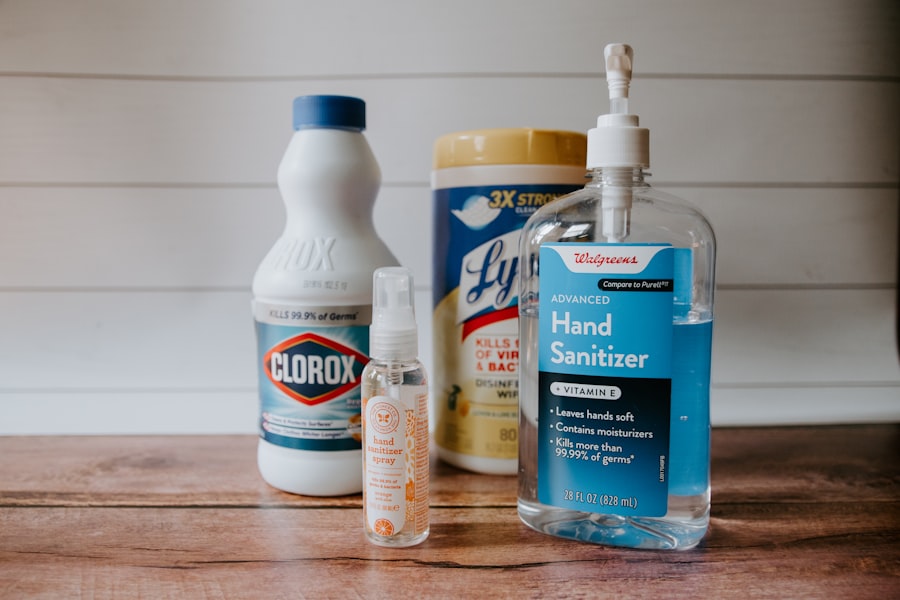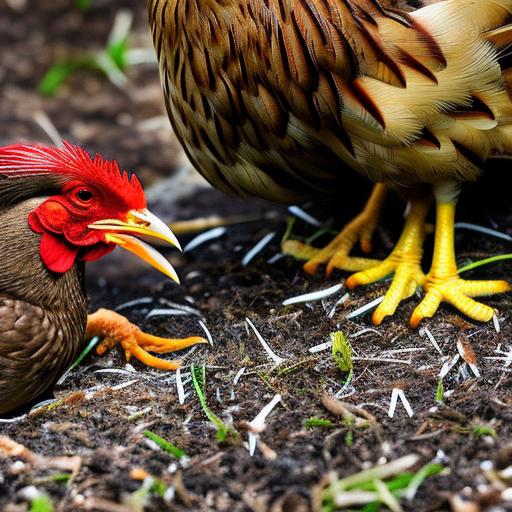Keeping chickens clean is an essential aspect of responsible chicken ownership. Cleanliness plays a crucial role in the health and well-being of chickens, as poor cleanliness can lead to various health issues and even death. In this article, we will explore the importance of cleanliness in chickens, the factors that can affect their cleanliness, and how chicken owners can help maintain their chickens’ cleanliness.
Key Takeaways
- Cleanliness is crucial for the health and well-being of chickens.
- Factors such as weather, coop design, and flock size can affect chicken cleanliness.
- Chickens can keep themselves clean through preening and dust baths.
- Dust baths are essential for chicken cleaning and should be provided in the coop.
- Proper coop design and maintenance, as well as natural and chemical cleaning methods, are necessary for maintaining chicken cleanliness and preventing health issues.
Understanding the Importance of Cleanliness in Chickens
Cleanliness is crucial for the health and well-being of chickens. When chickens are kept in dirty and unsanitary conditions, they are more susceptible to diseases and infections. Bacteria, parasites, and viruses thrive in dirty environments, and chickens can easily contract these pathogens if their living spaces are not kept clean.
Poor cleanliness can lead to various health issues in chickens. Respiratory infections are common in dirty environments, as the dust and ammonia from accumulated droppings can irritate the chickens’ respiratory systems. Mites and other external parasites are also more likely to infest dirty coops, causing discomfort and potential health problems for the chickens. Additionally, dirty feathers can attract flies, which can lay eggs on the chickens’ bodies and lead to maggot infestations.
Factors Affecting Chicken Cleanliness
Several factors can affect the cleanliness of chickens. Weather conditions play a significant role, as rainy or muddy environments can quickly make chickens dirty. Wet feathers are more prone to becoming soiled with dirt and droppings, which can lead to bacterial growth and infections.
The design of the chicken coop also influences cleanliness. A well-designed coop should have proper ventilation to prevent the buildup of ammonia from droppings, which can cause respiratory issues in chickens. The coop should also have adequate space for the number of chickens it houses, as overcrowding can lead to increased dirtiness due to limited space for movement.
Diet is another factor that affects chicken cleanliness. A balanced and nutritious diet can contribute to healthy feathers and skin, making it easier for chickens to keep themselves clean. On the other hand, a poor diet can result in dull feathers and dry skin, making it more challenging for chickens to groom themselves effectively.
Can Chickens Keep Themselves Clean?
Chickens are capable of keeping themselves relatively clean through their natural grooming behaviors. They use their beaks to preen and clean their feathers, removing dirt, parasites, and excess oil. However, there are instances where chickens may need human intervention to maintain their cleanliness.
Owners can help chickens keep themselves clean by providing them with a dust bath. Dust baths are essential for chickens as they help remove excess oil and dirt from their feathers. A dust bath consists of a shallow container filled with fine dust or sand that chickens can roll around in. This behavior helps them dislodge dirt and parasites from their feathers.
The Role of Dust Baths in Chicken Cleaning
Dust baths are an integral part of chicken cleaning routines. Chickens instinctively know the benefits of dust baths and will actively seek them out if provided with the opportunity. Dust baths help chickens maintain healthy feathers by removing excess oil and dirt, preventing matting and clumping.
To create a dust bath for chickens, you will need a shallow container such as a plastic tub or a designated area in the coop filled with fine dust or sand. The dust or sand should be loose enough for the chickens to easily roll around in. It is important to keep the dust bath area dry, as wet sand or dust can become compacted and less effective.
Chickens should have access to a dust bath at all times, especially during periods of high humidity or when the ground is wet. Providing a dust bath once or twice a week is usually sufficient, but you may need to increase the frequency during particularly dirty or muddy conditions.
The Importance of Proper Chicken Coop Design for Cleanliness

The design of a chicken coop plays a significant role in maintaining cleanliness. A well-designed coop should have features that promote cleanliness and make it easier for chicken owners to keep the coop clean.
Proper ventilation is crucial for maintaining cleanliness in a chicken coop. Good airflow helps reduce the buildup of ammonia from droppings, which can cause respiratory issues in chickens. Ventilation can be achieved through windows, vents, or fans, depending on the size and design of the coop.
Adequate space is also essential for cleanliness. Overcrowding can lead to increased dirtiness, as chickens may not have enough space to move around and keep themselves clean. The coop should have enough room for the number of chickens it houses, with sufficient space for perches, nesting boxes, and feeding areas.
Tips for Maintaining a Clean Chicken Coop
Maintaining a clean chicken coop is essential for the health and well-being of your chickens. Here are some practical tips to help you keep your coop clean:
1. Establish a regular cleaning schedule: Set a schedule for cleaning the coop, including removing droppings, replacing bedding, and disinfecting surfaces. Regular cleaning will help prevent the buildup of bacteria and parasites.
2. Use proper waste disposal methods: Dispose of chicken waste properly to prevent contamination and odors. Composting is an eco-friendly option that can turn waste into nutrient-rich soil for your garden.
3. Provide clean bedding: Replace soiled bedding regularly to maintain cleanliness and prevent bacterial growth. Straw, wood shavings, or shredded paper are suitable bedding options.
4. Keep feeders and waterers clean: Regularly clean and sanitize feeders and waterers to prevent the growth of bacteria and algae. Dirty feeders and waterers can lead to health issues in chickens.
5. Remove any potential hazards: Inspect the coop regularly for any potential hazards, such as sharp objects or loose wires. Removing these hazards will help prevent injuries and keep the coop clean.
Common Chicken Health Issues Related to Poor Cleanliness
Poor cleanliness in chickens can lead to various health issues. Here are some common health problems that can arise from poor chicken cleanliness:
1. Mites and lice infestations: Dirty coops provide an ideal environment for mites and lice to thrive. These parasites can cause discomfort, skin irritation, and feather loss in chickens.
2. Respiratory infections: Ammonia buildup from accumulated droppings can irritate the chickens’ respiratory systems, leading to respiratory infections. Symptoms may include coughing, sneezing, and difficulty breathing.
3. Foot infections: Wet and dirty conditions can lead to foot infections in chickens. Bacterial or fungal infections can cause swelling, redness, and lameness in affected chickens.
4. Maggot infestations: Flies are attracted to dirty feathers and can lay eggs on the chickens’ bodies. These eggs hatch into maggots, which can cause painful wounds and infections if left untreated.
Natural and Chemical Cleaning Methods for Chicken Coops
There are different cleaning methods that can be used to keep a chicken coop clean. Natural and chemical options are available, each with their own pros and cons.
Natural cleaning methods involve using non-toxic substances such as vinegar or hydrogen peroxide to clean the coop. These substances are effective at killing bacteria and parasites without posing a risk to the chickens’ health. However, natural cleaning methods may require more effort and time compared to chemical options.
Chemical cleaning methods involve using disinfectants or pesticides specifically designed for use in chicken coops. These products are effective at killing bacteria, viruses, parasites, and insects but may contain harsh chemicals that can be harmful to the chickens if not used correctly. It is important to follow the instructions provided by the manufacturer and ensure that the coop is properly ventilated during and after cleaning.
Keeping Your Chickens Clean and Healthy
In conclusion, cleanliness is of utmost importance for the health and well-being of chickens. Poor cleanliness can lead to various health issues and even death in chickens. Factors such as weather, coop design, and diet can affect chicken cleanliness, but owners can help by providing dust baths and maintaining a clean coop.
Regular cleaning schedules, proper waste disposal, and good ventilation are essential for maintaining a clean chicken coop. Common health issues related to poor cleanliness include mites and lice infestations, respiratory infections, foot infections, and maggot infestations.
Natural and chemical cleaning methods can be used to keep the coop clean, but it is important to follow instructions and ensure the safety of the chickens. By prioritizing cleanliness, chicken owners can help ensure the health and well-being of their feathered friends.
If you’re interested in learning more about how chickens can keep themselves clean, you should definitely check out this informative article on Poultry Wizard. It provides valuable insights into the topic and offers practical tips for chicken owners. To read the article, click here: Can Chickens Keep Themselves Clean?
FAQs
What is the natural behavior of chickens when it comes to cleanliness?
Chickens are naturally clean animals and will spend a significant amount of time preening and grooming themselves.
Do chickens need to be bathed or cleaned by their owners?
In most cases, chickens do not need to be bathed or cleaned by their owners. They are capable of keeping themselves clean through their natural grooming behaviors.
What are some of the ways that chickens keep themselves clean?
Chickens keep themselves clean by dust bathing, preening their feathers, and shaking off dirt and debris.
What is a dust bath and why is it important for chickens?
A dust bath is a behavior in which chickens roll around in dirt or sand to clean themselves. This is important for chickens because it helps to remove excess oil and dirt from their feathers, which can help prevent parasites and other health issues.
Can chickens get dirty or messy in certain situations?
Yes, chickens can get dirty or messy in certain situations, such as when they are kept in overcrowded or unsanitary conditions. In these cases, it may be necessary for owners to provide additional cleaning or bathing to keep their chickens healthy.
Meet Walter, the feathered-friend fanatic of Florida! Nestled in the sunshine state, Walter struts through life with his feathered companions, clucking his way to happiness. With a coop that’s fancier than a five-star hotel, he’s the Don Juan of the chicken world. When he’s not teaching his hens to do the cha-cha, you’ll find him in a heated debate with his prized rooster, Sir Clucks-a-Lot. Walter’s poultry passion is no yolk; he’s the sunny-side-up guy you never knew you needed in your flock of friends!







